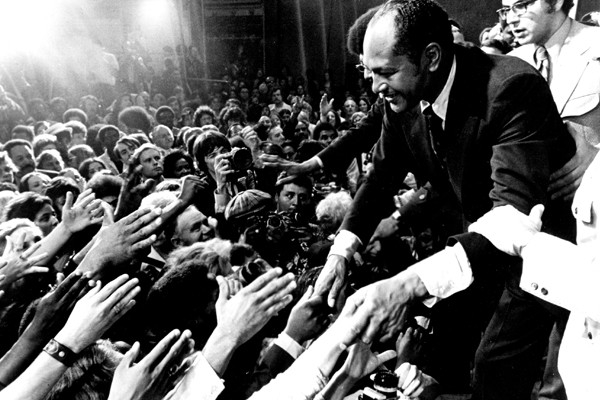Lyn Goldfarb is an Academy Award-nominated and
award-winning filmmaker specializing in historical and social-issue
documentaries for PBS and major cable. Her series and documentaries include “The New Los Angeles,” “California and the American Dream,” “Japan: Memoirs of a Secret Empire,” “The Roman Empire in the First Century” and “With Babies and Banners.” She has produced documentaries for the major PBS series “The Great War,” “The Great Depression” and “People in Motion.” Goldfarb also produces short
documentaries for museums, exhibitions and non-profits, including the J. Paul
Getty Museum and the Guadalajara International Book Fair. She was selected as a
film expert to represent the United States abroad as part of the American Film
Showcase in 2012 and 2013. (Press materials)
“Bridging the Divide: Tom Bradley and the Politics of Race” premiered at the 2015 Los Angeles Film Festival on June 14.
W&H: Please
give us your description of the film playing.
LG: “Bridging the Divide: Tom Bradley and the Politics of Race” tells the
little-known story of Mayor Tom Bradley, the first African American mayor of a
major US city with an overwhelmingly white population. Bradley transformed
Los Angeles through an extraordinary multi-racial coalition and, in the process,
changed American racial politics. “Bridging the Divide” also brings into sharp
focus the relationship between the police and minority communities, [focusing on] police
abuse and police reform. This is the story of the challenges which face
our cities, the importance of coalitions and the complexities of social and
economic change.
W&H: What
drew you to this story?
LG: I grew up in Los Angeles, and it was a very different city than it is
today. Throughout the years, I witnessed the transformation of a city from a white, conservative enclave to one of the most diverse, dynamic
and progressive cities in the United States and the world. And as a
documentary filmmaker, I wanted to understand what happened and how it
happened. Tom Bradley was at the center of the change.
I also wanted to tell the story of
the real Los Angeles, often hidden behind the façade of a Los Angeles of
celebrities, beaches and blonds. Our film is the story of
multi-ethnic Los Angeles finding its voice, identity and power in the face of
discrimination and political disenfranchisement.
Documentaries are powerful vehicles
to tell untold stories and to give voice to people whose stories are left out of
the news or our history books. I believe we learn about ourselves and our lives through those who have stood up for a set of beliefs and, against all obstacles,
have changed the world in which they lived. Documentaries reveal the enduring
spirit in stories that still have an impact on our world today.
W&H: What
was the biggest challenge in making the film?
LG: Probably the greatest challenge in making a historical documentary
is finding the footage and the stills, which enabled us to tell a powerful and
engaging story. Making a film like “Bridging the Divide” is a collaborative process, and I
worked closely with Alison Sotomayor. Alison and I produced and wrote the film,
and she was the Research Director.
W&H: What
do you want people to think about when they are leaving the theatre?
LG: I hope that people gain a new understanding of Los Angeles and how
change occurred. I also would like people to think about the importance
and the complexities of coalitions and how diversity shapes the policies and
directions of a city and the nation. And in this difficult time of
increasing police brutality against people of color, I hope that this film will
provide insights into the challenges that Tom Bradley and the city of Los
Angeles faced in the ongoing struggle to bring about police reform.
W&H: What
advice do you have for other female directors?
LG: Follow your passions, no matter how difficult the challenges. Filmmaking is never easy, but if you believe in yourself and your dreams, you
can succeed. Be patient and persevere. And in my experience as an
independent documentary director, you will need to juggle all aspects,
from the creative to the logistics and the fundraising. Learn as much as
you can about aspects of filmmaking and be prepared.
W&H: What’s
the biggest misconception about you and your work?
LG: I don’t think supporters of our work can ever understand the
difficulties and challenges of making documentary films and how long it
actually takes to make a film.
W&H: How
did you get your film funded? Share some insights into how you got the film made.
LG: We are independent filmmakers, and we had to raise all the funds
ourselves. We were very fortunate to receive a major grant from the National
Endowment for the Humanities, although it wasn’t easy. We submitted three proposals
for development funds before we received a research and development grant, and two proposals for production funding before we received the grant that enabled
us to finish production.
We also received early support by Cal Humanities and
the W.K. Kellogg Foundation, which enabled us to begin the film. We also
received funding from the California Community Foundation, the Ralph M. Parsons
Foundation, the Los Angeles City Council Heritage Fund, Los Angeles City
Council President Herb Wesson and Los Angeles City Councilmembers Bernard
Parks and Tom LaBonge. The film took six years to make and, throughout the
process, we conducted fundraising campaigns targeted at individuals in Los
Angeles who wanted to see this film made.
W&H: Name
your favorite woman-directed film and why.
LG: I have admired many women directors throughout the years. Two of my favorite women directors are Barbara Kopple and Ava DuVernay. I believe both Kopple, with “Harlan County, USA” and DuVernay, with “Selma,” have directed films which tell challenging stories with
emotion and resonance. They are incredible directors.







